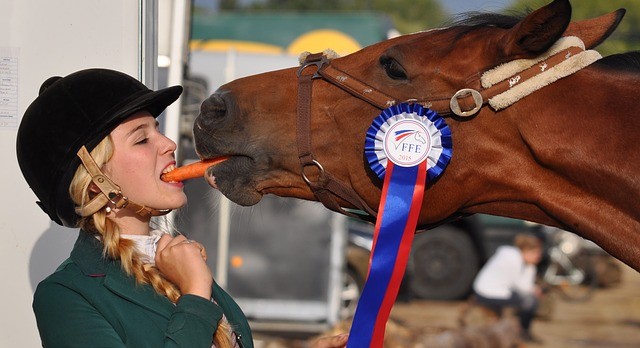Feeding Your Horse in Winter

Winter changes many things, but the most noticeable of them all is feeding. Horses require more food to make it through the winter happy, healthy, and proper weight. While every horse handles winter differently depending on factors such as breed, exercise, weight before winter, blanketing, etc. These will often be affected by your region and the weather you receive as well as areas that receive temperate weather with no snow are not nearly as hard on your horse as an area that receives 4+ feet of snow.
You should plan on feeding your horse an extra 1% of their daily calories for every degree below freezing (30 degrees). In places like Florida, where the temperature rarely drops below 40, this means that there is no real reason to up their feed by much other than to give them something to chew on. In North Dakota, however, where temperatures can reach a frigid -60, you would almost have to double your horse’s caloric intake daily.
If we take a 1,000-pound horse that is lightly ridden, they would require approximately 15,000 calories a day. If they are given 1% of their body weight in hay a day, that would be 10 pounds of hay per day. If they are on an Orchard Grass Hay, that would mean that they would require an additional 6,300 calories approximately. If you were to add a complete feed to that, you would need to use 4.2 pounds.
Hay
Since horses can only eat so much hay, it is unrealistic to think that you can simply feed hay in the winter, and the horse won’t be short a few calories. You can up the horse’s hay intake to 2.5% of their body weight which would provide approximately 22,000 calories a day, leaving a mere 6,500 calories remaining. This could be made up in grains or complete feeds.
Grain
If you were to increase the horse’s hay to 2.5% of their body weight, in this case, they would require approximately the same amount of complete feed to meet their daily needs. You can also add beet pulp, sweet feed, or rice bran for additional calories.
Supplements
Many horses end up low on nutrients over the winter. It is important to make sure that these needs are met, and there are many options available when it comes to supplements. Your veterinarian and local feed store would be able to give you advice suited to your horse.
Things to take into consideration
Not all bales of hay are the same. While one flake may weigh 6 pounds, others in the bale may only weigh 3-4 pounds. This can alter your calculations when it comes to how much food they are actually receiving. This is why it is very important to weigh your food, not just measure.
I hope this helps. If this has been helpful, please consider sharing with others in your social network.
How To Sell Your Horse Fast
Do you want to sell your horse fast? We've put together a guide to help you understand your options and walk you step by step through the process.




